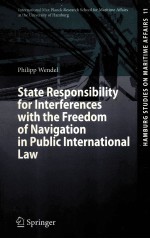

STATE RESPONSIBILITY FOR INTERFERENCES WITH THE FREEDOM OF NAVIGATION IN PUBLIC INTERNATIONAL LAWPDF电子书下载
- 电子书积分:11 积分如何计算积分?
- 作 者:
- 出 版 社:SPRINGER
- 出版年份:2007
- ISBN:3540743324
- 页数:288 页
Introduction 1
Chapter Ⅰ:The perpetual conflict between freedom and security in the Law of the Sea 5
A.The freedom of navigation-cornerstone of the Law of the Sea 5
Ⅰ.Freedom of navigation-an instrument of common sense rather than a legal argument 6
Ⅱ.Exclusive Flag State Jurisdiction-from an instrument to maintain maritime power to a key to liberalize maritime transport 9
Ⅲ.Free navigation for worldwide economic growth and development 12
B.Security concerns brought forward to interfere with navigation 16
Ⅰ.Piracy-an ancient,but persistent business 17
Ⅱ.Terrorism and weapons of mass destruction-the new dominant concern 25
1.Scenarios of terrorist attacks on maritime trade 26
2.Potential economic impact of terrorist attacks on maritime trade 28
3.Preventive and repressive measures to combat maritime terrorism 29
a)Ship and port security 29
b)Interception operations 32
Ⅲ.Undocumented Migration 36
Ⅳ.Narcotic drugs and psychotropic substances 39
Ⅴ.Illegal fishing 44
Ⅳ.Pollution 47
Ⅶ.Fading away and back-up grounds for interferences 49
C.Legal limits for interferences and the role of State responsibility 51
Chapter Ⅱ: Principles drawn from the treaty provisions on State responsibility for interferences with navigation on the high seas 57
A.Treaty interpretation 58
Ⅰ.Interpretation of the wording 60
Ⅱ.Interpretation of the context 61
Ⅲ.Object and purpose 63
Ⅳ.A hierarchy of methods under Art.31 VCLT 64
Ⅴ.Supplementary means of interpretation 65
B.An individual right to claim compensation? 67
Ⅰ.The ordinary meaning of the relevant provisions 68
Ⅱ.Context 70
1.The structure of the Law of the Sea Convention 70
2.The conventions succeeding the Law of the Sea Convention 71
3.Subsequent practice 72
4.Rules of general international law 75
5.Invocation of State responsibility by private entities in maritime matters 79
6.The primary right affected by the interference 84
a)Freedom of navigation:a right of the flag State or of the"ship"? 84
b)The relevance of the right to property 88
7.Conclusion 91
8.Meaning of"the ship" 91
Ⅲ.Object and purpose 93
Ⅳ.Preparatory work 94
1.The Law of the Sea Convention 94
2.The Intervention Convention 97
3.The Straddling Fish Stocks Agreement 101
4.The Migrant Smuggling Protocol 104
5.The 2005 Protocol to the SUA Convention 106
Ⅴ.Conclusion 111
C.The act entailing responsibility:requirement of wrongfulness? 112
Ⅰ.Art.110,para.3 LOSC,the prototype of liability for lawful conduct in the Law of the Sea 113
Ⅱ.Hot pursuit under Art.111,para.8 LOSC 115
Ⅲ.The seizure of pirate ships under Art.106 LOSC 116
Ⅳ.Interferences under the Intervention Convention 118
Ⅴ.Liability for interfering with the navigation of fishing vessels under the Fish Stocks Agreement 120
Ⅳ.Interferences in order to combat Migrant Smuggling 120
Ⅶ.Terrorism interdiction operations under the 2005 SUA Protocol 122
Ⅷ.The effect of the special nature of the compensation provisions 123
IX.Conclusion 125
D.Responsibility for attempted interferences 126
E.The liable entity-particularly in situations of multilateral boardings 127
Ⅰ.Bilateral boardings 128
1.The few indications in the analyzed provisions 128
2.The principles in the general law on State responsibility 130
a)Attribution 130
b)Participation 132
(1)Aid and assistance 133
(2)Direction and control 133
(3)Vicarious liability for internationally lawful conduct? 134
3.Joint and several liability? 135
Ⅱ.Interdictions within the framework of International Organizations 139
1.The scope of interferences involving International Organizations 140
2.Responsibility of the international or regional organization? 143
a)The United Nations 144
b)Regional organizations enforcing embargoes on the seas 146
c)Operation Enduring Freedom 148
d)Conclusion 149
3.Responsibility of member States for wrongful acts by an International Organization 149
4.The applicability of the compensation provisions to International Organizations 153
5.Conclusion 156
F.The effect of conduct by the boarded party 156
Ⅰ.Clean Hands Doctrine 156
Ⅱ.The limited reception of the doctrine in international maritime conventions 161
Ⅲ.Contributory negligence in the general law on State responsibility 162
Ⅳ.Contributory negligence in cases codified by maritime conventions 164
G.Consensual boardings 165
H.The extent of responsibility 170
Ⅰ.A comparison of the different provisions 170
1.The link between the conduct by the responsible State and the damage 170
2.Qualification of the damage 173
a)"Any loss or damage" 173
b)"Any damage,harm or loss" 175
Ⅱ.The provisions and the general law on State responsibility 176
Ⅲ.Types of damages which may be claimed and their calculation 179
1.Delay of the vessel 179
2.Expected profits 182
3.Value of the vessel and cargo 184
4.Detention and mistreatment of the crew 186
5.Punitive damages 189
6.Interest 192
a)Starting date 193
b)When does the interest stop to run? 195
c)The interest rate 195
7.Currency of the compensation 196
8.Damage to the flag state 197
9.Costs and expenses 198
10.The ability of the respondent State to compensate 199
Ⅳ.The Intervention Convention:distinction between disproportionate and proportionate damages? 200
J.Some procedural issues 203
Ⅰ.The onus of proof 203
Ⅱ.Competing claims of protection 207
Ⅲ.An obligation to forward the compensation award to the victim? 210
Chapter Ⅲ:The U.S.strategy:28 bilateral treaties and the Proliferation Security Initiative 215
A.The 1924 Liquor Treaties 216
B.The 1981 Exchange of Notes 217
C.Bilateral anti-drugs and migration agreements 219
Ⅰ.Shipboarding 222
Ⅱ.Shipriders 223
Ⅲ.Entry-to-investigate and pursuit 224
Ⅳ.Conclusion 225
D.Liability under the loose framework of the Proliferation Security Initiative. 225
E.Ship Boarding Agreements within the framework of the Proliferation Security Initiative 227
F.United States law on State Liability 229
Chapter Ⅳ:Compensation for interferences in international conflicts 233
A.The law of naval warfare 233
Ⅰ.Three views concerning the legality of visit and search of neutral vessels in times of war 234
Ⅱ.Compensation under the traditional law of naval warfare 236
Ⅲ.Liability under the San Remo Manual 241
Ⅳ.The restrictive view and its consequences for State responsibility 242
Ⅴ.The development of the damages covered in the law on State responsibility and its consequences for the law of naval warfare 242
Ⅳ.Conclusion 244
B.Interdictions authorized by the United Nations Security Council 244
Chapter Ⅴ:Conclusions and outlook 249
A.Major conclusions 249
B.Outlook to the future of the liability regime concerning interferences with navigation on the high seas 251
Annex 1:Relevant compensation provisions 253
Annex 2:Bibliography 255
Annex 3:Table of cases 279
